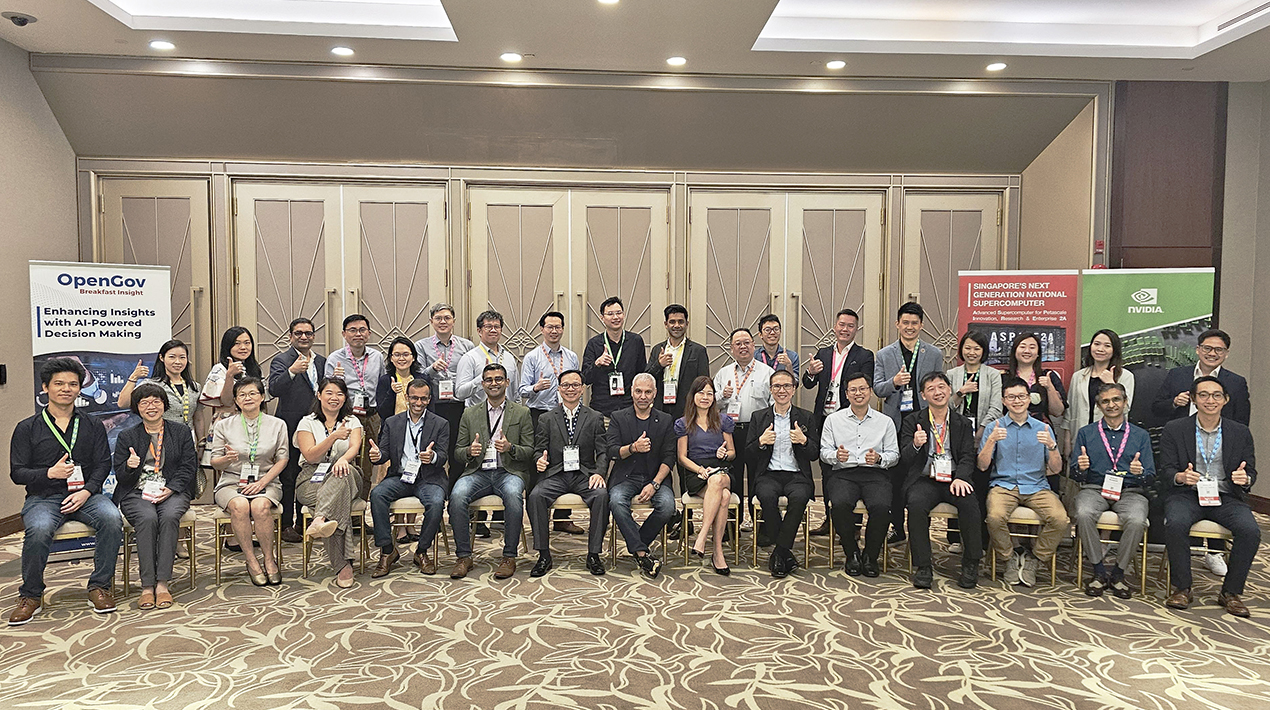
|
Getting your Trinity Audio player ready...
|
Singapore leads the way in data-driven decision-making within the public sector, setting the standard for others to follow. Its skilful use of Artificial Intelligence (AI) hasn’t just improved efficiency but also cemented its global authority in smart governance. This extends to various areas such as public administration, defence, aviation, maritime, and land transportation.
In the face of rising challenges in transportation, traffic, and logistics across major cities due to population growth and increased vehicular presence, Singapore stands out for its strategic embrace of AI. The capacity to collect and analyse extensive real-time data becomes essential in optimising traffic management, alleviating congestion, and enhancing public transportation systems.
AI drives a paradigm shift in transportation by facilitating the development and assessment of new routes, schedules, and pricing structures before their actual implementation. Meanwhile, logistics, a crucial element in today’s interconnected globe, undergoes substantial evolution with AI-powered solutions. These technologies enhance supply chain efficiency by scrutinising extensive datasets that include historical sales records, weather trends, and transportation details.
The implementation of predictive analytics emerges as a game-changer, providing invaluable insights into demand trends across sectors like public administration, aviation, maritime, and land transportation. This translates into heightened operational efficiency, reduced waste, lower carrying costs, and more precise resource allocation.
The strategic integration of AI optimisation results in real-time, precise routing, taking into account variables like traffic conditions, weather patterns, and road closures. The ripple effect includes significant savings in time and fuel, concurrently minimising the environmental footprint of transportation systems.
However, amid the transformative potential, the implementation of AI in various sectors also raises pertinent concerns, particularly in areas such as security and data privacy. Striking a balance between leveraging AI for efficiency and safeguarding sensitive information becomes crucial to ensuring the sustained success of these innovations.
Singapore’s success in harnessing the power of AI for data-informed governance serves as a blueprint for nations grappling with similar challenges. The nation’s commitment to pushing the boundaries of innovation while addressing concerns of security and data privacy exemplifies a holistic and strategic approach to digital transformation.
As Singapore continues to lead the charge in smart governance, the global community watches, anticipating a future where AI not only optimises efficiency but also safeguards the core tenets of security and privacy in the public sector.
The OpenGov Breakfast Insight on 18 January 2024 at the Equarius Hotel Singapore explored AI strategies for public sector, defence, aviation, maritime, and land transportation agencies, uncovering the profound impact of Artificial Intelligence on smart governance and decision-making.
Opening Remarks

Embracing AI’s potential, governments and organisations globally are shaping more intelligent, adaptable governance structures that cater to the evolving demands of the twenty-first century. In this dynamic landscape of artificial intelligence (AI), Singapore has emerged as a world-renowned hub of innovation, distinguishing itself in the realms of intelligent governance and decision-making.
Mohit Sagar, CEO and Editor-in-Chief of OpenGov Asia, highlights Singapore’s status as a pivotal global hub for AI progress, attracting substantial investments in robotics, AI, and Internet of Things (IoT) technologies.
The Smart Nation and Digital Government Office (SNDGO) underscores Singapore’s dedication to AI, notably through the publication of the National AI Strategy as early as November 2019. This strategy charts a course for Singapore to lead in scalable AI solutions by 2030, targeting pivotal socio-economic sectors. Nevertheless, this pursuit is not devoid of challenges, encompassing issues such as insufficient data literacy and skills, legal intricacies, and financial limitations.
“Singapore has adopted a comprehensive strategy to navigate these challenges, focusing on AI governance. The key objective is to build public confidence and resolve moral and legal concerns to facilitate widespread AI adoption,” Mohit explains. “By addressing the ethical dimensions, Singapore aims to create an environment conducive to the broad use of AI technology in the public sector.”
Mohit emphasises the pivotal role of operational efficiency within the public sector, highlighting Singapore’s relentless commitment to optimising resources, streamlining processes, and attaining objectives in a cost-effective and timely manner. This dedication results in enhanced service delivery, enabling government organisations to promptly address public demands and meet expectations effectively.
Singapore has extensively pushed AI integration across diverse industries such as finance, healthcare, and transportation. The government actively promotes AI research and development, nurturing innovation and fostering collaboration between the public and private sectors. This proactive support cultivates a robust ecosystem for AI advancements and applications across multiple domains.
Despite allocating a substantial portion of its land to roads and infrastructure, Singapore continues to grapple with the daunting task of establishing efficient and dependable transportation networks for its million-plus automobiles. Spearheaded by the government, various initiatives are underway, spanning open data and analytics, on-demand shuttles, contactless fare payment, and autonomous vehicles.
The Land Transport Authority (LTA) has deployed Intelligent Transport Systems (ITS) to furnish real-time information on traffic patterns, travel durations, and road utilisation, empowering commuters with data-driven insights for informed decision-making.
AI applications in public services, traffic control, and urban planning exemplify Singapore’s commitment to becoming a Smart Nation, positioning AI as a catalyst for sustainability, technological advancement, and global competitiveness.
AI assumes a critical role in fortifying defences against unauthorised access, data breaches, and cyber threats. Mohit underscores AI’s escalating significance in reinforcing cybersecurity by automating threat detection, analysing extensive datasets, and adapting to evolving risks. Its predictive prowess identifies potential vulnerabilities, empowering organisations to proactively address threats amid the escalating complexity of cyber risks.
The integration of AI into governance and decision-making heralds a transformative shift in operational paradigms for societies and organisations alike. Its capacity to analyse vast datasets, automate administrative tasks, and offer real-time data fosters transparency, efficiency, and agility in governance.
Singapore’s trajectory in AI adoption exemplifies a nation leading the charge in technological innovation, harnessing AI to redefine governance, transportation, and cybersecurity.
“Amid Singapore’s pioneering strides in smart governance, the global community is witness to a transformative shift, as AI not only enhances efficiency but also forms the bedrock of agile, transparent, and visionary governance frameworks,” Mohit concludes.
Knowledge Insight

In the era of rapid technological evolution, the intersection of data and artificial intelligence (AI) emerges as a game-changer, steering organisations towards unprecedented insights and operational efficiency.
In his compelling Knowledge Insight session, Alpesh Patel, Vice President and Chief Innovation Officer at Hyundai Motor Group Innovation Centre (HMGICS), sheds light on the transformative potential of the merging of AI and data.
AI, far beyond a technological marvel, stands as a strategic imperative, empowering organisations to extract profound insights from the vast reservoirs of data at their disposal. In the realm of automotive innovation, HMGICS leads a paradigm shift, positioning data as the new fuel propelling AI as the engine driving revolutionary advancements.
According to Alpesh, in the automotive industry, AI serves a crucial role in elevating precision and predictability across various domains. From predictive maintenance protocols to optimising intricate supply chains, AI-driven analytics redefine decision-making, surpassing conventional paradigms.
HMGICS’s mission revolves around understanding customer behaviour, a feat made possible through a comprehensive analysis of customer data facilitated by AI. Unravelling intricate patterns and preferences, AI becomes the catalyst for developing innovative, customer-centric solutions – ranging from personalised driving experiences to advanced safety features.
Addressing the imperative of sustainability, AI facilitates the optimisation of energy consumption, route planning, and emissions reduction. The seamless integration of data and AI underscores HMGICS’s commitment to creating a sustainable and eco-friendly future for mobility.
Beyond technological prowess, HMGICS’s commitment to AI integration extends to a broader vision – reshaping the future of mobility. Recognising the fusion of data and AI as a paradigm shift transcending industries, the centre emphasises key pillars in its strategy.
“Engaging actively with partners, startups, and industry leaders, HMGICS fosters a dynamic ecosystem that propels innovation,” says Alpesh.
In embracing the potential of AI, ethical considerations are paramount for HMGICS. A dedicated commitment to the responsible and ethical use of AI ensures that innovations align with societal values and contribute positively to the communities served.
In a landscape marked by rapid advancements, continuous learning and adaptation are integral. HMGICS places a premium on nurturing a culture of innovation, fostering an environment where teams continually evolve their skills and expertise.
Embarking on the journey of AI integration, the road ahead for HMGICS is laden with possibilities. From autonomous driving to intelligent mobility solutions, the synergy of data and AI stands as the key to unlocking new dimensions of innovation.
Alpesh urges the industry to embrace collaboration as an opportunity for learning and sharing, “Together, our collective efforts can harness the full potential of AI to navigate the future of mobility, driving transformative change in the realms of data-driven decision-making.”
Power Talk
Singapore is actively pursuing its vision to become a leading technological hub, embarking on initiatives to transform into a Smart City. The government and stakeholders collaborate to revolutionise daily life and business operations through effective technology integration. With the imminent digital revolution, Singapore recognises the urgency to adapt swiftly, leveraging technology for the advantages of rapid digitisation.
Key to this transformation is the implementation of new policies, particularly focusing on utilising data to formulate more objective and precise policy frameworks. This strategic approach aligns with Singapore’s commitment to staying at the forefront of technological progress and embracing the opportunities presented by the evolving digital landscape.

Weng Wanyi, Director of the National AI Office, Smart Nation and Digital Government Office highlights the great potential of artificial intelligence (AI) in assisting data processing. According to her, the implementation of AI can optimise data analysis, increase operational efficiency, and provide deep insights for better decision-making.
Singapore, in its determination to become a global technology hub, must see AI as a key driver in dealing with changing times. The nation is on the right track to becoming a world-leading Smart City nation by combining progressive policies, close collaboration between the public and private sectors, and technological innovation.
“Our vision for a digital-first Singapore is a place where Digital Government, Digital Economy and Digital Society leverage technology to bring about transformation in health, transportation, urban life, government services and business,” Weng says optimistically.
In addition, digital transformation brings many other benefits, including Digital Government. With the adoption of the Digital Government model, administrative efficiency increases significantly. Public services become faster, more responsive and affordable, providing openness and ease of access for the public.
The Digital Government initiative harnesses technology to streamline administrative procedures, expedite decision-making, and enhance government-citizen interactions. This innovation not only minimises bureaucracy but also fosters transparency and accountability in administration.
In the field of the Digital Economy, such a transformation becomes a significant catalyst for businesses to invest in technology and talent. Embracing advanced technology not only boosts operational efficiency but also unlocks avenues for global business expansion. Utilising the potential of the Digital Economy allows businesses to optimise production processes, elevate product and service quality, and innovate new business models.
Investment in talent is also a major focus in the Digital Economy. Increasing digital skills among the workforce will increase business competitiveness in this digital era. Education and training that focuses on digital skills are key to ensuring that the workforce has the capabilities needed to face the challenges and opportunities emerging in this economic transformation.
Further, Digital Society empowers individuals to develop their talents and be armed with the latest digital technologies to realise their greatest inspirations and live a better life together. The adoption of digital technology in everyday life allows people to engage in various creative, educational and entertainment activities.
“With easier access to information and online learning, individuals can continue to increase their knowledge in a variety of fields,” explains Weng. “Innovations in digital technology also open the door to creation and self-expression, allowing people to explore their talents and interests more interactively and dynamically.”
The Smart Nation initiative is a step forward. Technology will be so seamlessly integrated that it will change the way people work, live and play. With full commitment to digital transformation, Singapore aims to be a global leader in the use of technology to improve the quality of life and advance society as a whole. Through sustainable investment and innovative policies, it can build a strong foundation to achieve its vision as a progressive and inclusive technology centre.

Associate Prof Tan Tin Wee, who serves as Chief Executive at the National Supercomputing Centre (NSCC) Singapore emphasised the importance of artificial intelligence (AI) in facilitating industry research collaboration and enhancing Singapore’s research capabilities.
He stressed that AI is not only a tool that accelerates innovation in various sectors, but also a catalyst that expands the scope of research collaboration at the national and international level, “With AI technology, industrial research can benefit from more advanced data analysis, predictive modelling, and process automation.”
AI provides a strong foundation to bridge the gap between knowledge and implementation in various economic sectors. Additionally, enhanced research capabilities resulting from the integration of AI technologies could have a positive impact on Singapore’s competitiveness in the global research arena.
The synergy between the industrial sector and research institutions, including the National Supercomputing Centre, creates a collaborative ecosystem that supports the exchange of ideas and innovation, Associate Prof Tan adds. In an era of ever-evolving technology, this kind of collaboration is the key to achieving breakthroughs and solutions that can overcome complex challenges in various research fields.
As the integration of AI technology continues in research collaborations, especially in Singapore, it is hoped that innovation will accelerate, new opportunities will be opened, and a deeper understanding of contemporary challenges will be realised. In doing so, Singapore can play an increasingly significant role in the global research arena, strengthening its reputation as a hub for progressive and adaptive innovation going forward.

Dr Deb Goswami, Structured & Generative AI Technologist for Developer Programmes, Asia Pacific South, NVIDIA stresses that artificial intelligence (AI) is empowering change in every industry. From generative AI and voice recognition to medical imaging and improving supply chain management, AI provides companies with the computing power, tools, and algorithms their teams need to carry out their daily work.
Generative AI opens up new potential in content creation and design, while voice recognition enables more natural interactions between humans and technology. In the field of medical imaging, AI can improve diagnostic accuracy and facilitate more advanced medical research.
“Apart from that, AI also makes a significant contribution to improving supply chain management,” Dr Deb elaborates. “By analysing data in real-time, AI can help optimise logistics processes, identify market trends, and improve overall efficiency in the supply chain.”
In providing powerful computing power, tools and algorithms, NVIDIA’s AI plays an integral role in accelerating innovation across multiple sectors. This transformation not only creates operational efficiencies but also opens the door to the development of smarter and more adaptive solutions and services.
In conclusion, Dr Deb believes that AI is not merely a tool but the primary catalyst for revolutionising core operations, fostering innovation and facilitating adaptability in response to the dynamic requirements of the digital age. Its pervasive influence extends beyond utility, shaping the very essence of how companies navigate and thrive in this era of technological advancement.
Closing Remarks
As enterprises navigate the complexities of the modern business landscape, the need for AI integration becomes paramount. Mohit is convinced that AI is not confined to mere automation or efficiency enhancement; rather, it is a dynamic force that permeates the very fabric of business operations, strategy, and innovation. Its influence extends beyond individual companies to shape entire industries and sectors.
AI’s impact on businesses is not limited to automating routine tasks; it has the potential to revolutionise decision-making processes, enhance customer experiences, and open new avenues for growth. The strategic implementation of AI can provide a substantial competitive advantage, enabling businesses to stay ahead in a rapidly evolving landscape.
“Artificial intelligence serves as a transformative force, not just streamlining operational systems but also unlocking innovative opportunities for businesses to curate more personalised and customised interactions,” Mohit elaborates. “By leveraging AI, companies can navigate the evolving demands of the digital landscape, fostering heightened engagement and satisfaction among their clientele, thereby positioning themselves at the forefront of a technologically driven market.”
AI’s remarkable potential in fostering innovation is underscored by Mohit. The algorithms, propelled by machine learning and data analytics, have the capability to uncover insights and patterns that might be overlooked by human analysis.
This not only streamlines existing processes but also opens the door to novel approaches and solutions. Businesses that embrace AI as a strategic force position themselves at the frontiers of innovation, ready to adapt to emerging trends and capitalise on new opportunities.
Summarising, Mohit underscores the profound and far-reaching impact of AI, acknowledging that its transformative journey extends beyond individual businesses to influence and shape the collective future of entire industries.
“As companies across diverse sectors increasingly recognise the strategic importance of AI, its role becomes pivotal in fostering innovation, driving efficiency, and reshaping traditional paradigms, thereby positioning itself as a central force in the evolution of industries on a global scale,” Mohit concludes.
















